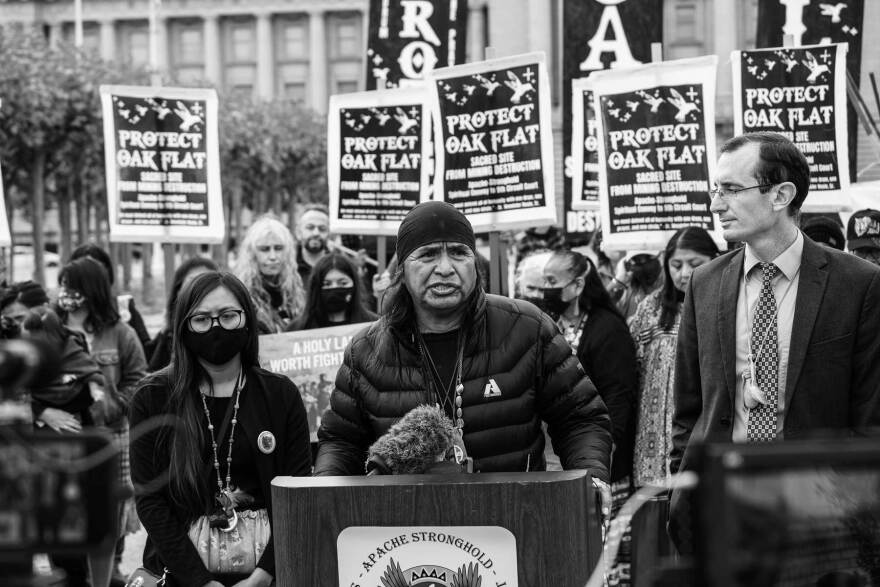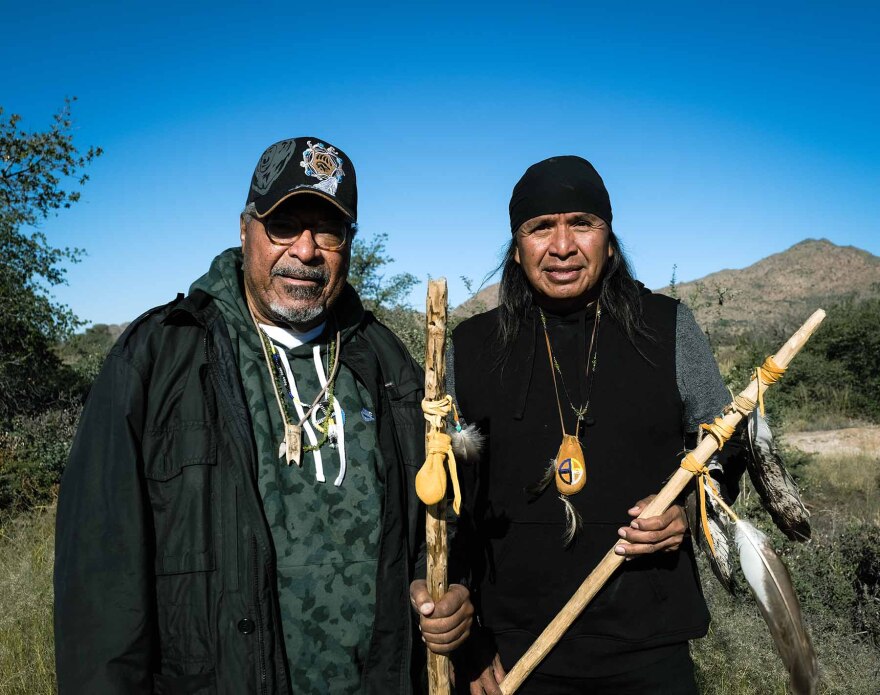Wendsler Nosie, an environmental activist and former tribal chairman for the San Carlos Apache Tribe, is in Rochester this week to discuss the fight to prevent the federal government from selling a chunk of sacred land to copper mining company Resolution Copper.
Oak Flat — called Biłdagoteel in Southern Athabascan — is a 7-square-mile reserve in the Tonto National Forest in Arizona that is home to a handful of endangered species. This federally-protected area is listed on the National Register of Historic Places, and is a sacred space to the Apache people.
But it has been subject to attempts by the federal government to sell it to mining interests since 2002.
In March, a federal appeals court reheard a challenge to the sale and a decision is pending. In the meantime, Nosie wants to increase visibility of the issue across the nation.
In his work with Apache Stronghold, Nosie fights to preserve holy spaces like Oak Flat. He’s also an environmental activist who argues that all Americans should stand against efforts by the government to sell federal lands to mining companies and other corporations. He says that mining within Oak Flat would lead to water contamination and other problems.
“You're talking about a crater being so far, so deep into the earth, that you're talking about 184 degrees that's going to rise to the surface,” Nosie said. “And you're talking about 50-mile radius of 10 degrees hotter.”
Nosie is scheduled to give a talk at Ganondagan State Historic Site at 1 p.m. on Saturday, April 22, presented by RIT’s Native American Future Stewards program. He's also slated to visit SUNY Geneseo on Wednesday, April 26, to deliver the keynote address for Geneseo’s annual Great Day event, and he’s scheduled to speak at the Downtown United Presbyterian Church on Thursday, April 27, for an Earth Day event organized by the Gandhi Institute.
His talk, titled “The Rumbling of Sacred Spaces: An Earth Day Message,” will touch on the fight for Oak Flat, and is part of a national tour of speaking engagements to raise awareness on the issue.

Joel Helfrich, an historian and adjunct professor at Geneseo, has studied Oak Flat and the fight to preserve it. He recommended Nosie as speaker for Geneseo’s event.
“The current struggle for Oak Flat, a sacred and ecologically unique place in Arizona, has a lot to do with issues of the green economy,” Helfrich said. “And also, outdated mining laws, and who really benefits from such things.”
Nosie’s activism blends bureaucratic battles and on-the-ground interference with proposals to adulterate land in and around Apache holy sites. He’s had some success in holding powerful entities at bay.
Mount Graham, called Dził Nchaa Sí'an in Southern Athabascan, is another sacred place to the Western Apache people. It has been a site of struggle since the 1980s, when the University of Arizona and its research partners, including Vatican astronomers, decided to build telescopes on the mountain.
“It's one of the most ecologically unique mountains in the United States,” Helfrich said. “I think it has more life zones than any other mountain in the United States. Imagine, imagine getting in a car and starting out in the desert. And in an hour or so, getting to a forested summer Summit, a Hudsonian boreal forest summit that looks like it's in northern Canada.”
Helfrich added that the mountain is home to 18 species that are found nowhere else in the world. That includes one of the most imperiled mammals on the planet, the Mount Graham red squirrel.
The project as proposed would have led to the installation of 32 telescopes and would have included environmentally destructive infrastructure, Nosie said. Through an educational campaign and alliances with groups including the Sierra Club, Apache Stronghold was able to limit the number of telescopes installed to three. He said that he would like to see them removed eventually.

As part of his activism, Nosie is travelling the nation to build awareness and support for lands that are on the opposite side of the country from some of his audiences. Preserving these lands require everyone’s voice, he said.
"We're talking about federal lands,” he said. “So from Arizona to all the states of this country, everybody has a say, and if everybody's paying attention to the news, Congress is talking about giving up a lot of the federal land to private owners and corporations. And once it's gone, and corporations own the water, the minerals and so forth, it’s gone.
"It's important for us Native people, but it's important for the rest of the country to understand the devastation of the environment,” Nosie said. “And we've got to come to the point that we understand when enough is enough.”


